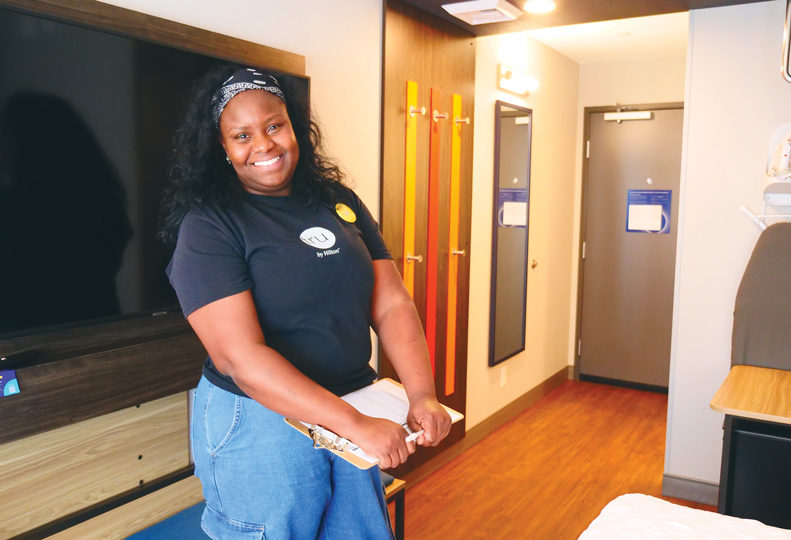
Home » Hospitality workforce mostly recovers to pre-pandemic rates
Hospitality workforce mostly recovers to pre-pandemic rates
Industry employment boosted by youth, foreign-born workers

Paola Fory, originally from Colombia, joined Tru by Hilton Spokane Valley as a housekeeper through World Relief. Fory is now housekeeping manager of the 92-room hotel.
| Erica BullockFebruary 29, 2024
It's a tale of two labor outlooks in the hospitality industry, in which urban centers and accommodation companies are taking longer to bounce back from pandemic-related workforce shortages compared to suburban and rural areas in Spokane County and the food service sector.
In Spokane County, overall hospitality employment has mostly recovered to pre-pandemic workforce totals, according to Lightcast statistics provided by Mike McBride, business and industry analyst at Spokane Workforce Council. Lightcast provides labor market analytics and is headquartered in Moscow, Idaho.
Overall employment in the hospitality industry was 3.5% above 2019 job totals, Lightcast data shows. However, employment numbers indicate food service employment is attracting more workers than the accommodation sector, which was 2% below 2019 totals last year.
McBride says food service companies are benefiting from increased youth employment.
"With the continued labor market tightness, high schoolers are truly keeping the restaurant industry afloat," says McBride.
It's a worker's market, says Anthony Anton, president and CEO of Washington Hospitality Association.
"People spending money in hospitality is back, and our employment is generally back," Anton says. "A lot of people didn't think they'd come back to hospitality, but they have because of all the great things we offer."
Employers in the hospitality industry have shifted to offer more shift flexibility for workers, increased wages, and many companies are focused on improving work culture.
Grant Guinn, co-owner of Tru by Hilton Spokane Valley, says the hotel is one of 16 in the city of Spokane Valley, so in order to attract needed talent, he's partnered with Spokane-based nonprofit World Relief and has leaned into creating a culture where people want to work.
Between 20 and 25 people work at the Spokane Valley hotel, some of whom are non-English speakers and youth employees, Guinn says.
"We love having partnerships with organizations like World Relief, where we're able to help place their refugees into the workforce after they're able to get their documents," says Guinn. "We've had some really good success with organizations like that, and we appreciate those types of sponsorships."
Housekeeping manager Paola Fory joined Tru by Hilton through World Relief.
"We've helped her grow within the organization over the past year, now she's our head housekeeper," Guinn says. "We have so many resources now available to us that we can attract not only English speakers, but those who are legally able to work who don't speak English. That's been a huge benefit to us."
Some hospitality companies are ramping up recruitment efforts to focus on people under 18 to meet labor needs.
Employees between the ages of 14 and 18 years old are making up more of the Spokane County hospitality workforce in 2024 than in 2019, Lightcast employment data shows.
Of the 26,400 hospitality employees in the Spokane area, youth employees make up 12% of the industry's workforce, up 4 percentage points from 2019.
In food service, employees in that teenage range make up 14% of industry jobs, up from 9% five years ago. In the accommodation sector, the youth workforce remains the same as in 2019, at 2%, according to data provided by McBride.
Anton says, "If you look at the state as a whole, it's going to look like we're back on track with 2019. That masks the difference between what's going on in urban centers ... versus suburbs and neighborhoods and rural areas."
In downtown cities with convention business, Anton says the hospitality industry still is catching up to pre-pandemic activity.
"The convention business is certainly not back yet, and it's going to take a few years to recover," says Anton. "A lot of people are still working virtually, so they're not downtown for lunch ... and they're not having downtown business meetings."
All of the efforts that went into attracting convention business to Washington state before the pandemic, dried up when the state closed for business in March 2020, Anton explains. Due to uncertainty regarding when activity would resume, recruiting conventions to take place in 2024 and 2025 also stopped.
"You typically need to sell about three to four years in advance to fill in the larger conventions," explains Anton. "So we didn't recruit during COVID and a ton of conventions that came to Washington and Spokane ... for years as a tradition, had to go somewhere else while the governor had to shut down."
"Areas that were open during COVID, their convention businesses are booming, so it's not that conventions nationwide are down, but they're certainly down in Washington," Anton says.
While that sentiment may hold true across the state, Spokane may be ahead of the trend in recovering its convention business, as Rose Noble, president and CEO of Visit Spokane, says the city is tracking past pre-pandemic levels of convention activity by 10%, while the national average is still down 9.1%.
Anton says competition is fierce for convention activity among major urban areas in Washington state.
"We're now recruiting against each other ... versus recruiting people that we're bringing from out of state," he says. "We're now fiercely eating out of our own fish pond."
Other factors are contributing to a slow recovery in urban centers across Washington state, Anton says. Activities in downtown Spokane tend to be more expensive in a tightened economy where people are trying to save money, and public safety concerns have turned some people away from spending time in the city at night.
Inflation pricing has helped some hospitality companies in suburban areas, where people are saving money by staying closer to home, Anton says.
"They're spending money that they used to spend in urban areas, in their neighborhoods," he says. "I'm concerned that it's going to take a while to recover."
Latest News Up Close Retail Instagram
Related Articles
Related Products
Related Events





![Brad head shot[1] web](https://www.spokanejournal.com/ext/resources/2025/03/10/thumb/Brad-Head-Shot[1]_web.jpg?1741642753)